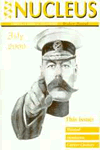Theology is a word that strikes fear into the heart of many and induces narcolepsy in others. It needn’t be so. For a Christian, what topic could be more stimulating than studying the character of God and the nature of his workings with mankind?
Granted, we can be put off by the thought of thick, dusty tomes in difficult language; or we may wonder just what there is to write so much about. Alister McGrath proves a worthy guide to smooth the road and set us on our way.
The book gives a brief introduction to ten Christians whose writings have influenced the church, from the 4th to the 20th century. Stand with Athanasius at the council of Nicea in AD325, as he defends the divinity of Jesus against those who claim he is only a created being. Follow Anselm, 11th century Archbishop of Canterbury, as he tackles the necessity of Jesus’ death - why couldn’t God simply forgive sin? Or join Zwingli, Swiss hero of the Reformation, as he addresses Communion - why is it necessary and just what happens when we take it?
Biographical details set the scene in each chapter and introduce the issue concerned. Each writer’s train of thought is followed through, the objections to their teachings being answered simply and logically. Then McGrath sets out why each historical debate is still vitally relevant to the average Christian today. Every section concludes with a very helpful guide on where to look further into the works of that writer.
I found this book fascinating, satisfying and easy to read. It has whet my appetite to seek out more gems from those who have gone before us in the faith. We are told that ‘he who walks with the wise grows wise’ (Pr 13:20) and I guarantee that sampling the work of these great thinkers will do just that.
































